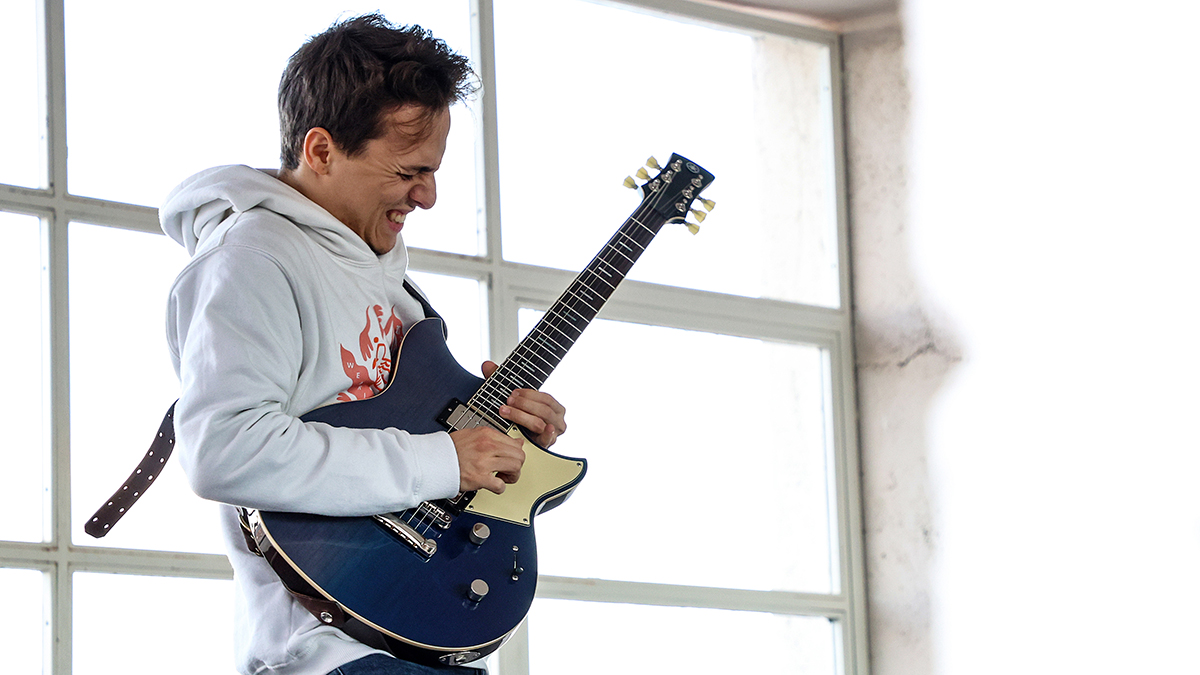
To say that Matteo Mancuso has had a big 2024 would be an understatement. After earning plaudits from the likes of Steve Vai, Joe Bonamassa and Al Di Meola before releasing any material whatsoever, the Sicilian virtuoso then dropped his debut record, 2023’s The Journey, which has continued to wow just about anyone who hears it.
Now, he is comfortably considered one of today’s foremost virtuosos, a household name that has spent much of the past 12 months pushing the limits of his incomparable playing style.
Yes, the things Mancuso does are utterly incomprehensible, but he isn’t worried about competing with the greats he’s wowing. “The guitar is such a personal instrument,” Mancuso tells Guitar World. “You can’t compare yourself to other people. I know Steve [Vai] said something like, ‘You can’t duplicate what Matteo does,’ but it’s the same for me – I can’t duplicate what he does. I can’t replicate what Al Di Meola does. I don’t compare myself to these kinds of players because they are giants.”
But Mancuso, who is just 28, is a giant. Few possess his style-meets-skill vibe, and even fewer have been classified as halcyon so quickly.
“It adds pressure, that’s for sure,” Mancuso says. “If these kinds of players are talking about you, you feel happy. Steve gave me some good advice: ‘Concentrate on music and not too much on guitar.’ You can open up a lot of new ideas with that mindset.”
You’ve had an incredible year, and you’ve done it without being hyper-present on social media – at least compared to other players.
“Social media impacts the community a lot. The information you can find sometimes influences us in a good way and sometimes in a bad way. If you gain a lot of followers on Instagram or grab somebody’s attention and make people say, ‘Wow,’ that sometimes means shredding it, but it’s probably the best choice.
“That’s why people on Instagram tend to focus on that. They tend to focus more on Instagram reels rather than actual music. I always say, ‘Never judge a guitar player by a short reel.’ But to make it work, you have to do really short videos with a lot of ‘Wow.’ People tend to concentrate too much on the ‘Wow.’”
Is social media a good or bad thing for the guitar community?
“It’s not, ‘Okay, this is my music. Check it out.’ It’s just a video on Instagram. It’s not my music. If you want to check out my music, check out Spotify or YouTube. I sometimes do videos and just upload them on Instagram, but they’re not to be associated with my musical offerings. They’re separate things.
“But we have an advantage as a generation because everything is available on the internet. We’re probably better off than the previous generation – not because we’re better, but because it’s easier for us to reach a certain level faster.”
Does being a guitar player in the internet era come with stressors people might not realize?
All the people from my generation need to be very consistent online; everything is recorded
“Now that everybody is doing live videos, if you have a bad gig, it will end up on YouTube or Instagram. People will see it if you’re drunk at a gig, for example. We need to pay attention. I don’t like to be recorded – not because I don’t want to see people doing it, but because I think you need to enjoy the moment.”
Being present these days is extremely important – and very difficult.
“In the old days, maybe in the ’80s, if you had a bad gig, or were drunk and puked on the stage, maybe somebody would tell the story, but there was no video proof. Now it’s more dangerous. That’s why I keep myself in very good shape. All the people from my generation need to be very consistent online; everything is recorded.”
Have there been any moments this year where you felt like you tripped yourself up?
“Sometimes I feel stuck. For example, if I play too much of the same thing, I’ll feel musically stuck. To be passionate about music, you need to have a varied listening diet – not just one thing or the other. To keep the passion up, it’s important to listen to new music and play the guitar through the records.”
Is that mainly how you keep your inspiration fueled?
“That is something I like to do – and I don’t study too much. It’s useful to study the guitar alone so you can explore ideas, but you need to take inspiration from external stuff. Playing through records is something I do all the time to keep my interest in the guitar up.”
Your main guitar is the Yamaha Revstar, but do any other guitars inspire you?
“I haven’t found a guitar that is… I don’t want to say better, because that’s subjective. I see myself playing it, and that didn’t happen with most guitars. That really happened with the Revstar. When I started working with Yamaha, I was searching for a guitar similar to the [Gibson] SG because I’m a big SG fan. But I was searching for a guitar that was a little more versatile because I was already doing jazz-oriented tunes, and I wanted to keep using a solid body guitar.”
The Revstar is a cool-looking guitar.
“Aesthetically speaking, I really like it. It’s something I pick for myself, and I like playing. But there are many other brands to check out sometimes, like Gibson and Fender. I’m lucky because my father is a guitar player, and he has many guitars at home. I was able to check out a lot of guitars before trying the Revstar.”

What’s your best piece of gear advice?
I’m an incredibly lazy guy. I don’t want to bring anything with me but the Helix
“Buy a small pedalboard that does everything. I’m an incredibly lazy guy. I don’t want to bring anything with me but the Helix. Otherwise, it’s too big for when I’m traveling. You need to have a travel rig, and it’s important to have a small pedalboard that does pretty much everything and is reliable. And if we’re talking about guitars, it’s all a matter of preference.”
How have you progressed as a player over the past year?
“One or two years ago, when I played live, I was putting too much pressure on myself. I didn’t want to make mistakes and always wanted to be as flawless as the recording. I was able to do that sometimes, but there were nights where maybe you don’t feel comfortable, or not at your best.
“It can happen to anyone. I’ve learned to not put too much weight on mistakes. This helped me be more in the moment live and enjoy the music rather than concentrating too much on my performance. This especially changed this year because I played a lot. I wanted people to hear the energy.”
Most people don’t expect perfection at shows anyway.
“They don’t want to hear a flawless performance. The first ingredients need to be energy and emotion while playing. I don’t worry about mistakes like I did before, and that comes with experience. I didn’t work on it; it came from the gigs.
“I still have work to do there, because when I do make a mistake, you can see it on my face that I’m disappointed. Some people, when they make a big mistake, they’re always smiling, but I can’t really do that. If I make a mistake, you might not hear it, but you will notice it on my face, but not as much as before.”
What else would you like to improve upon for 2025?
“A lot of things. [Laughs] The key element I’d like to improve is composition. I never studied it in a real, clear way, so most of the compositions from the first album are just, ‘Okay, let’s try to do something with the guitar and see what happens.’ I didn’t have a routine for compositional stuff, so I’d like to be more structured about that – and learn more about composition, in general.”
How will you do that?
“There are more guitaristic ways, like working on my timing. I’m starting to use a metronome more. Not just with every beat; I’m searching for unusual time signatures. Instead of using a metronome on the strong beat, I’ll use it on the last eight or 16 bars before the downbeat. Timing is one of the most important aspects of a musician. How you’re able to interact with time and visualize the thing you’re working on is important.”
Why do you feel you’re playing has resonated with so many people?
“I think the things that I do are… I don’t want to say impossible, but most things I do are hard to play. People might like that because it’s something fresh. But the technical point of view is just one thing; whenever I solo, I always search for balance between melody and shred, which people seem to like.”

How do you find the perfect balance?
“Music is like everything in life, where there’s tension and release. A lot of notes is the release, and fewer notes is the tension – but you need that balance. I like to play a lot of notes because, for me, it’s a release of energy. It’s not something I do to show you I can do it.”
So the search for that balance is never-ending.
“I think that’s something people like about it; I’m always trying to find that balance. I don’t consider myself one of the best technical players; there are so many good players who can play twice as fast as me, or they know more leads and have more vocabulary. But people don’t care about your technical stuff; people care about the emotion of it. I’m always trying to search for that.”
- The Journey is out now via Mascot/The Player's Club.







